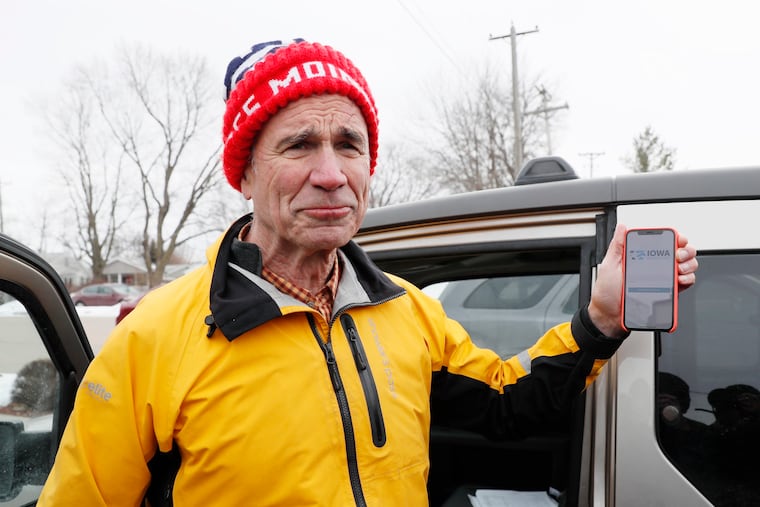The Iowa caucus was chaotic garbage. Why not let Pennsylvanians vote first instead? | Opinion
The Keystone State can't do any worse than this week's mess.

Iowa produces a lot of great things: wrestlers, writers, bacon. But when it comes to producing coherent caucus results, Iowa has failed.
The American experiment will survive the great bungling that was the 2020 Iowa caucuses, just as it survived the bungling in 2016 and 2012. But by now, Iowa has used up its chances. It’s time to consider letting Pennsylvania go first.
I don’t have a personal horse in this race. I grew up in Wisconsin. I live in California. I write for a TV show about jerks who live in Philadelphia, where It’s Always Sunny, and am marrying into a yinzer family this summer (my fiancé’s from Pittsburgh). Like many Midwesterners, I’ve driven through Pennsylvania a few times, and like many sophomoric out-of-state college students, I’ve posed for a photo beside town signs in Lancaster County that double as euphemisms (looking at you, Blue Ball). But beyond that, I have no ties to the Keystone State. My prescriptive comes from a place of genuinely wanting something better for democracy.
I’ve got nothing against Iowa. But even without the chaos of caucuses, as a kickoff location for a presidential election it’s got a litany of shortcomings. I’m not the first to point out that it’s much whiter than America as a whole — 90% white, to the country’s 60%. Or that it contains no major cities (Des Moines isn’t in the top 100 largest U.S. cities by population). From the fields of corn in one corner to the fields of soybeans in the other, it’s hard to reach from a lot of other major cities. And there just aren’t that many people.
» READ MORE: Buttigieg, Sanders ahead in Iowa, but results still not complete
Pennsylvania, on the other hand, has more in common with the rest of America. Demographically, there are dense urban centers with large nonwhite populations, including one of the 10 largest cities in the U.S., plus sparse rural areas populated by mostly white people. Western Pennsylvania has a cultural affinity with the Midwest, but the state also contains a piece of Appalachia and, as a bonus, borders New Jersey (what a ride!). Pennsylvania’s got plenty of colleges and universities, museums and zoos — but also many people who haven’t pursued advanced education and live in underserved areas. And, a bonus: There’s a truly wacky array of regional accents.
Many of Pennsylvania’s problems also mirror the country’s: the opioid epidemic, underemployment, the collapse of industry and manufacturing, urban and rural blight in different parts of the state at the same time, climate change angst. Name a Pennsylvania problem. Somebody else, somewhere else has it, too. (Even the Steelers’ headache of a quarterback depth chart isn’t unique — what NFL team can honestly say it has a rock-solid backup QB?)
It makes practical sense to hold the first primary in Pennsylvania. Candidates invest millions to compete in the Iowa caucuses, only to abandon most of those efforts, since it doesn’t make sense to go wild spending money to chase the state’s four electoral votes. Pennsylvania, on the other hand, is a big prize with 20 votes. Like my home state of Wisconsin, it’s a perennial battleground. Wouldn’t it be a better allocation of resources for both parties to build out primary campaigns there, with the assumption the winners will keep them there through the general election?
» READ MORE: Political Cartoon: Trump wins Iowa caucuses
It’s much easier for campaign surrogates and journalists to travel from D.C. or New York to Pennsylvania than to Iowa — in many cases, coastal media elites could take a train instead of an airplane! And, as a symbolic bonus, Philadelphia was the meeting place of the First Continental Congress in 1774, and served as the U.S. capital while D.C. was being built on a hot swamp to the southeast.
Pennsylvania isn’t a perfect miniature U.S. It’s still older and whiter than the country as a whole. With four times the population of Iowa, it’s a tougher proving ground for underdog campaigns. But it’s much closer to a microcosm than what we’re currently working with. And frankly, it’s hard to imagine Pennsylvania doing a worse job than this week’s mess.
Erin Ryan is the host of Crooked Media’s “Hysteria” podcast, a writer for “It’s Always Sunny in Philadelphia,” and a contributor to the Daily Beast. She lives in Los Angeles.